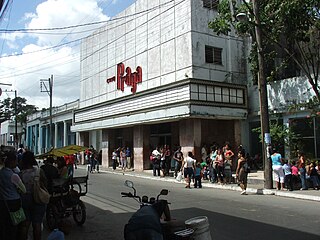Agliberto Melendez is a Dominican film director best known as the director of A One Way Ticket (Un Pasaje de Ida), the Dominican Republic's first feature-length film, produced entirely in the Dominican Republic by a Dominican cast and crew. The film became known to American audiences after its 1988 debut in New York City at the Museum of Modern Art's New Directors/New Films Festival. A One Way Ticket gained some notoriety because of its macabre subject matter; the story of would be immigrants who die in their desperate struggle to escape a fate of poverty and despair. A One Way Ticket, shot under very adverse conditions, proved to everyone that it could be done.
In 1979 Agliberto Melendez founded the Cinemateca Nacional, quickly becoming the meeting place for like-minded film enthusiasts. He single-handedly led the Cinemateca Nacional through very hard times but managed to stay afloat until it was finally forced to close its doors in 1986 following the election of right wing candidate Joaquín Balaguer. The Cinemateca Nacional introduced classics from the world cinema to a fresh and enthusiastic new audience.
His perseverance and single-minded vision made Agliberto Melendez the undisputed film pioneer of Dominican Cinema. He currently teaches cinema studies in the Dominican Republic and prepares his next feature: "Del Color de la Noche" based on the life of José Francisco Peña Gómez which he began preproduction this year.

A movie theater, cinema, or cinema hall, also known as a movie house, picture house, the movies, the pictures, picture theater, the silver screen, the big screen, or simply theater is a building that contains auditoria for viewing films for public entertainment. Most, but not all, movie theaters are commercial operations catering to the general public, who attend by purchasing tickets.

An independent film, independent movie, indie film, or indie movie is a feature film or short film that is produced outside the major film studio system, in addition to being produced and distributed by independent entertainment companies. Independent films are sometimes distinguishable by their content and style and the way in which the filmmakers' personal artistic vision is realized. Usually, but not always, independent films are made with considerably lower budgets than major studio films.
French New Wave is a French art film movement that emerged in the late 1950s. The movement was characterized by its rejection of traditional filmmaking conventions in favor of experimentation and a spirit of iconoclasm. New Wave filmmakers explored new approaches to editing, visual style, and narrative, as well as engagement with the social and political upheavals of the era, often making use of irony or exploring existential themes. The New Wave is often considered one of the most influential movements in the history of cinema.

Last Action Hero is a 1993 American fantasy action comedy film directed and produced by John McTiernan and co-written by Shane Black and David Arnott. It is a satire of the action genre and associated clichés, containing several parodies of action films in the form of films within the film. The film stars Arnold Schwarzenegger as Jack Slater, a Los Angeles police detective within the Jack Slater action film franchise, while Austin O'Brien co-stars as Danny Madigan, a boy magically transported into the Slater universe, and Charles Dance as Mr. Benedict, a ruthless assassin from the Slater universe who escapes to the real world. Schwarzenegger also served as the film's executive producer and plays himself as the actor portraying Jack Slater.
José Cuauhtémoc "Bill" Melendez was an American character animator, voice actor, film director and producer. Melendez is known for working on the Peanuts animated specials. Before Peanuts, he previously worked as an animator for Walt Disney Productions, Warner Bros. Cartoons, and UPA. Melendez provided the voices of Snoopy and Woodstock in the latter as well.

Cinema arrived in Cuba at the beginning of the 20th century. Before the Cuban Revolution of 1959, about 80 full-length films were produced in Cuba. Most of these films were melodramas. Following the revolution, Cuba entered what is considered the "Golden age" of Cuban cinema.

Cinema of Colombia refers to the film industry based in Colombia. Colombian cinema began in 1897 and has included silent films, animated films and internationally acclaimed films. Government support included an effort in the 1970s to develop the state-owned Cinematographic Development Company which helped produce some films yet struggled to stay financially viable. FOCINE went defunct in 1993. In 1997 the Colombian congress approved Law 397 of Article 46 or the General Law of Culture with the purpose of supporting the development of the Colombian film industry by creating a film promotion mixed fund called Corporación PROIMAGENES en Movimiento. In 2003 Congress also approved the Law of Cinema which helped to restart the cinematographic industry in Colombia.

The double feature is a motion picture industry phenomenon in which theatres would exhibit two films for the price of one, supplanting an earlier format in which one feature film and various short subject reels would be shown.

Denmark has been producing films since 1897 and since the 1980s has maintained a steady stream of product due largely to funding by the state-supported Danish Film Institute. Historically, Danish films have been noted for their realism, religious and moral themes, sexual frankness and technical innovation.

Brazilian cinema was introduced early in the 20th century but took some time to consolidate itself as a popular form of entertainment. The film industry of Brazil has gone through periods of ups and downs, a reflection of its dependency on state funding and incentives.

Limite is a film, directed, written and produced by Mário Peixoto, who was inspired by a photograph by André Kertész. Limite was filmed in 1930 and first screened in 1931. It was restored from 1966 to 1978 from a single damaged nitrate print, and one scene remains missing.

A cinematheque is an archive of films and film-related objects with an exhibition venue. Similarly to a book library, a cinematheque is responsible for preserving and making available to the public film heritage. Typically, a cinematheque has at least one motion picture theatre, which offers screenings of its collections and other international films.
The cinema of Ecuador has a long history, including both short and feature-length films made throughout the 20th century, but until recently Ecuadorian film has generally not had a large impact.

Leonard Retel Helmrich is a Dutch cinematographer and film director. He was born the 16th of August 1959 in Tilburg, Netherlands and has lived in Amsterdam since 1982. He received highest honours for international documentaries at the Sundance Festival and was the first two-time International Documentary winner at the International Documentary Filmfestival Amsterdam (IDFA). On June 5, 2018 he was rewarded by the Dutch King Willem-Alexander with the title Knight in the Order of the Netherlands Lion, a very high distinction.
Clemente Felipe de La Cerda Martin was a film director from Venezuela. He directed one of the highest grossing Venezuelan films, Soy un delincuente , in 1976. His movies were notable for their depiction of social problems.
José María Cabral González is a Dominican film director, screenwriter, and producer. He is considered one of the most important directors of the Dominican Republic. He has directed seven feature films. Cabral Gonzalez is recognized as the first Dominican filmmaker to be selected by the Sundance Film Festival with his movie ¨Woodpeckers¨.

Román Chalbaud is a Venezuelan film director and screenwriter, as well as a prominent playwright. Starting work in television after prestigious training, Chalbaud moved into making films before the industry took off in his home country, returning to theatre where he had been a great success for several years until filmmaking became a viable industry again. He has served as the president of Venezuela's leading theatre, television, and film organisations. A documentary about his life and work called Román en el universo de las maravillas, produced by Argentinian filmmakers, was released on 17 March 2018 in Altamira, Caracas at the Rómulo Gallegos Center for Latin American Studies.

Eduardo Darino is a Uruguayan film producer, director, animator, and cartoonist.

One Way Ticket is a 1988 Dominican drama film directed by Agliberto Meléndez. The film was selected as the Dominican entry for the Best Foreign Language Film at the 61st Academy Awards, but was not accepted as a nominee.